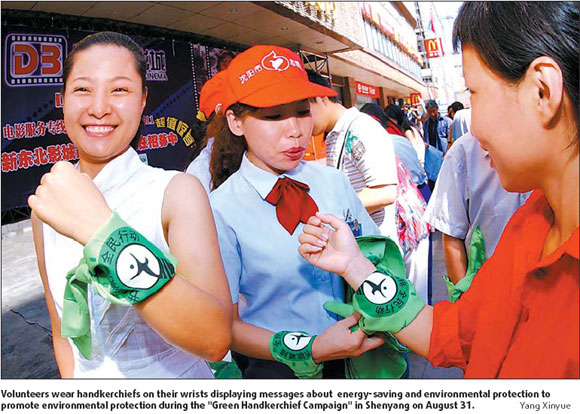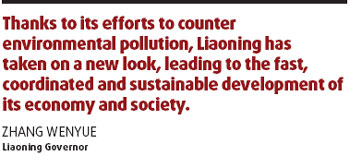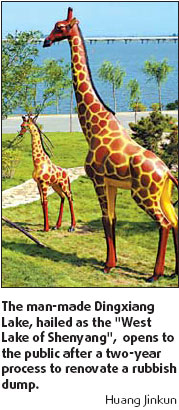Liaoning focuses on green industries

"Thanks to its efforts to counter environmental pollution, Liaoning has taken on a new look, leading to the fast, coordinated and sustainable development of its economy and society," said Liaoning Governor Zhang Wenyue.
"Shenyang, capital city of Liaoning Province, has devoted great efforts to adjust its economic structure and bring environmental pollution under control since the launch of the Northeast China Old Industrial Base Rejuvenation Strategy by the central government under the 10th Five-Year Plan (2001-05)," said city Mayor Li Yingjie in an address to the Second China-Japan Energy-Saving and Environmental Protection Forum held on September 27.
A famous old industrial base in China, Shenyang used to be a heavily polluted city. In its efforts to tackle the problem by promoting energy-saving and green sectors, the city has energetically developed new energy sources and speeded up the development of a circular economy.
A total of 78.8 billion yuan has been injected into the implementation of over 460 key projects to reverse the city's environmental situation.
As a result, it has received numerous awards such as National Model City in Environmental Protection, National Model City in Construction of Circular Economy, National Forest City, and the United Nations Best City for Living.

Statistics show that energy consumption for 10,000-yuan production value in Shenyang last year was 0.32 ton of coal, down 9 percent year-on-year. Meanwhile, the number of days with first and second-class air quality reached 321 a year.
The rate of wastewater treatment soared from 17 percent in 2000 to the current 73 percent, while all municipal solid waste now goes through harmless treatment.
The city saw its water area increase from 2.43 percent in 2000 to 7.71 percent last year, with green coverage standing at 41.2 percent.
It is estimated that application of ground source heat pump technology will help save 1.625 million tons of coal equivalent, reduce 26,500 tons of sulfur dioxide emission, and cut smoke and dust discharge by 20,400 tons a year by the end of the 11th Five-Year Plan (2006-10).
Li said Shenyang has been engaged in fruitful cooperation with various Japanese corporations in the field of energy saving and environmental protection.

Japan is a world leader in technology related to municipal solid waste burning, wastewater treatment, use of regenerative energy, and constructing energy-saving buildings, while Shenyang possesses a complete industrial chain in this particular sector, which translates into great potential for mutual cooperation.
The municipal government of Shenyang has decided to set up a green technology industrial park in the Tiexi District over a 10-sq km area, which will emphatically attract small and medium Japanese companies committed to the development of environmental protection technology and its commercial usage.
Li has promised to implement preferential taxation and services policies for the park.
Finally, the mayor expressed hope that concerned departments of both the Chinese and Japanese governments will lend generous support to the construction of the park.
Li's viewpoints were echoed by the leaders of the National Development and Reform Commission and the Ministry of Commerce who lauded Shenyang's successful efforts at intensifying environmental protection and energy saving.
(China Daily 10/12/2007 page19)














